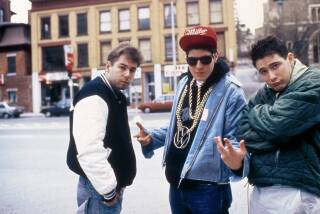Tom Waits Sues Frito-Lay, Says His Voice Appropriated
- Share via
Singer Tom Waits testified Thursday that he was shocked, embarrassed, and “angry--very angry,” the first time he heard a corn chip radio jingle that imitated his voice.
“Somebody had studied me a little too close,” Waits said on the third day of what is expected to be a two-week trial in Los Angeles. “It was the equivalent of all the scars, dimples, the lines all being in the same place. . . . It was a little spooky.”
Attorneys for Waits are trying to persuade U.S. District Court jurors of a novel claim: that his voice was illegally impersonated when Frito-Lay Inc. of Plano, Tex., used a sound-alike artist in an ad campaign for a new corn chip, the Salsa Rio Dorito. Waits has asked for at least $4 million from Frito-Lay and its ad agency, Tracey-Locke Inc. of Dallas, because they allegedly damaged his reputation and conducted a false advertising campaign by airing the commercial, which sounds very similar to Waits’ “Step Right Up.”
Under questioning from his attorney, Howard King, Waits said he has been paid only once, about 10 years ago, to advertise a product. “I was down on my luck and needed the money. So I agreed to do a voice-over for a dog food commercial--I always liked dogs,” Waits explained, evoking laughter from the jurors.
But afterwards, Waits said, he felt like “artistically, I had sold myself down the river. I felt I had betrayed something in me.”
Ever since then, Waits said, he consistently has rejected many offers to do commercials for products ranging from tennis shoes to motor homes. “Artists live somewhere in their dreams and they deal with a lot of ideas and thoughts,” he said. “I think they should be kept in that world.” Moreover, using his voice to advertise “a party snack would be a waste of my time,” Waits testified.
Asked if he would have agreed to do the Frito-Lay commercial--dubbed a “corn chip sermon” by Waits at one point--or whether he would have approved it, Waits answered, “absolutely not.”
Waits’ attorneys are trying a win under a new legal theory that stems from a 1988 case by actress-singer Bette Midler. In the Midler case, the 9th U.S. Circuit Court of Appeals created law by declaring it illegal to deliberately imitate the voice of professional singer in an advertisement, when that voice is distinctive and widely known.
The Waits case could clarify the Midler decision. Legal experts have been uncertain about what is meant by the requirement that a voice be distinctive and well-known because Waits, despite his unique, gravelly voice, is far less recognizable than Midler.
Much of the questioning by King was aimed at showing jurors that Waits is well known and that his voice is distinctive.
More to Read
The biggest entertainment stories
Get our big stories about Hollywood, film, television, music, arts, culture and more right in your inbox as soon as they publish.
You may occasionally receive promotional content from the Los Angeles Times.










